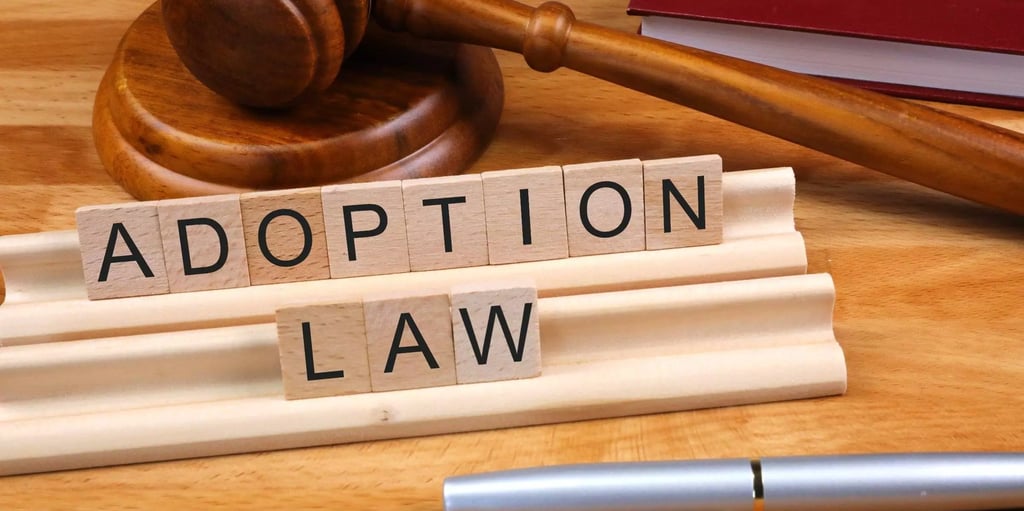ADOPTION LAWS: PROCESS AND CHALLENGES
India’s adoption laws, primarily governed by the Juvenile Justice (Care and Protection of Children) Act, 2015 and the Hindu Adoption and Maintenance Act, 1956, provide a legal framework for ensuring children's welfare. The adoption process, regulated by the Central Adoption Resource Authority (CARA), aims to facilitate both domestic and inter-country adoptions while prioritizing the best interests of the child. However, challenges such as bureaucratic delays, lack of inclusivity for LGBTQ+ individuals, cultural stigmas, and transparency issues hinder its efficiency. Judicial pronouncements have shaped adoption laws, yet reforms are necessary to streamline processes, enhance inclusivity, and increase public awareness. Strengthening CARA, digitizing adoption records, and addressing social stigmas will ensure a more transparent and child-centric system, fostering a secure and nurturing environment for adopted children.


ADOPTION LAWS: PROCESS AND CHALLENGES
Introduction:
The adoption process within India constitutes a profound legal and emotional undertaking. It establishes a permanent and legally recognised filial relationship between adoptive parents and a child and frequently provides a nurturing and stable home environment for children in need of parental care. The legal framework governing adoption in India is complex and multifaceted, reflecting the nation's diverse cultural and religious landscape.1 Adoption law is primarily codified in the Juvenile Justice (Care and Protection of Children) Act, 2015.In actual sense The Hindu Adoption and Maintenance Act of 1956, beautified by provisions of the Guardians and Wards Act of 1890, it pertains to other religious communities. Historically, adoption practices in India were significantly influenced by religious customs and traditions, with each community adhering to its own distinct set of rules and procedures governing the adoption process. Before the independence of India, a formal codification of adoption laws was conspicuously absent, resulting in substantial disparities in adoption practices across different religious groups. The latter independence era witnessed a concerted effort to get uniformity in adoption laws, reflecting the pluralistic nature of Indian society, culminating in the enactment of the JJ Act. This legislative instrument provides a secular and universally applicable approach to adoption, transcending religious boundaries. The JJ Act governs domestic adoptions and articulates procedures for inter-country adoptions, aligning with international treaties and conventions, notably the Hague Convention. The significance of adoption within Indian family law cannot be overstated. It serves as a significant mechanism for ensuring the welfare and well-being of children who have been orphaned, abandoned, or surrendered, providing them with the opportunity to experience stability and a sense of belonging within a family structure. The JJ Act enshrines the paramount principle of the child's best interests, providing clear and unambiguous guidelines for prospective adoptive parents and establishing the Central Adoption Resource Authority as the regulatory body entrusted with overseeing and regulating the adoption process. This discourse explores the intricacies of the adoption process in India, elucidating key legal provisions, eligibility criteria for prospective adoptive parents, and the various challenges encountered throughout this complex yet ultimately rewarding journey. Landmark judicial pronouncements that have shaped and influenced the evolution of adoption laws will also be examined, highlighting their impact on current adoption practices. By delving into these multifaceted aspects, the objective is to provide a comprehensive understanding of the legal and practical dimensions of adoption in India, thereby equipping prospective adoptive parents with the essential knowledge necessary to navigate this often-complex legal landscape.
Evolution Of Adoption Law:
The evolution of adoption law within India has been majorly shaped by a series of landmark judicial pronouncements that have addressed the inherent complexities of personal laws and, most importantly, the rights and welfare of children. These judgments, while not always directly focused on adoption per se, have nonetheless created a jurisprudential framework that influences adoption practices and legal interpretations. The Shah Bano Case (1985), while primarily concerned with the maintenance rights of divorced Muslim women, indirectly impacted adoption discourse by underscoring the imperative for a more uniform judicial approach to personal laws, thereby emphasising the welfare of children irrespective of their community affiliation. The case of Shah Rukh Khan v. Central Adoption Resource Authority (2005) Involving an intercountry adoption by a prominent public figure resulted in critical clarifications regarding adoption procedures. The Supreme Court, in this instance, reinforced CARA's pivotal role in overseeing international adoptions, ensuring meticulous compliance with established legal protocols and safeguarding the fundamental rights of children during such processes. Reena (Minor), Through Guardian v. Union of India (2005), Provided significant clarification concerning inter-country adoptions, elucidating the statutory requirements for foreign nationals seeking to adopt Indian children. This judgment clarified procedural aspects under the Juvenile Justice (Care and Protection of Children) Act,11 Thereby streamlining the adoption process for foreign nationals while prioritising the child's welfare. The Naz Foundation v. Government of NCT of Delhi (2009)12 Case, while primarily focused on decriminalising consensual homosexual acts, extended the discourse on adoption rights to include considerations related to same-sex couples, highlighting the legal and social implications of LGBTQ+ rights within the context of family law. This ruling implicitly recognised the need for more inclusive policies that address the complex issue of adoption by same-sex couples, potentially fostering a more equitable and non-discriminatory legal framework. R. Pramila v. Union of India (2018)13 Brought much-needed clarity to the legal age requirements for prospective adoptive parents under the Juvenile Justice Act, affirming that both single individuals and couples are eligible to adopt children. Thus, the act broadened access to adoption opportunities for various individuals and families.
Challenges faced:
Despite these notable advancements, several challenges plague the Indian adoption landscape. Bureaucratic delays, often characterised by lengthy waiting times and a significant backlog of children awaiting adoption, create substantial barriers for prospective adoptive parents. Inefficiencies in the matching process frequently manifested in mismatches between the profiles of children available for adoption and the preferences of prospective parents, further complicating successful placements. Inter-country adoption procedures, while governed by international conventions such as the Hague Convention, often present additional hurdles for foreign nationals seeking to adopt Indian children. Transparency issues, including a lack of accountability within some adoption agencies, can lead to unethical practices, eroding public trust in the system. Cultural barriers, such as prevailing social stigmas surrounding adoption, particularly for children from marginalised backgrounds, continue to hinder broader societal acceptance of adoption as a viable and positive family-building option. Financial constraints, particularly the high costs associated with international adoptions, effectively preclude many families from pursuing this option. Adopted children in India have specific rights that must be rigorously protected. These include post-adoption rights concerning inheritance and maintenance, which are essential for ensuring stability and security in the lives of adopted children. Access to psychosocial support and counselling is also crucial for addressing potential identity issues and facilitating smooth family integration post-adoption. The right to information, explicitly balancing a child's right to know their biological heritage with legitimate privacy concerns, remains a complex and sensitive issue within adoption law, requiring careful consideration and nuanced legal solutions. These landmark judgments and ongoing challenges underscore the dynamic and evolving nature of adoption law in India, highlighting the significant progress and crucial areas that still require further reform and attention.
Further way ahead:
The landscape of adoption law within India is poised for significant and necessary reform, driven by the exigency to streamline existing processes, cultivate greater inclusivity, and elevate public awareness regarding adoption as a viable family-building option. Streamlining the adoption process constitutes one of the most pressing issues confronting adoption practices in India. Bureaucratic delays, often protracted and cumbersome, create significant impediments for prospective parents. Recent directives issued by the Supreme Court emphasise the imperative for the digitisation of records and enhanced coordination between governmental bodies and non-governmental organisations to ensure timely and efficient placements of children in need of adoptive families. The establishment of specific and enforceable timelines for processing adoption cases is crucial in substantially reducing waiting periods for prospective adoptive parents. Furthermore, the implementation of regular and systematic identification drives for children eligible for adoption can effectively bridge the existing gap between the number of children awaiting placement and the number of families expressing a willingness to adopt. The inclusion of LGBTQ+ rights within adoption laws represents another critical area requiring immediate attention. Current legislation does not explicitly permit same-sex couples to jointly adopt a child, creating a significant lacuna in legal protections and denying these families the opportunity to build families through adoption. Legal reforms should prioritise the creation of an inclusive and equitable framework that recognises the right of all individuals, irrespective of gender identity or sexual orientation, to adopt children. This paradigmatic shift aligns with contemporary human rights standards and principles of non-discrimination and enriches the diversity and composition of adoptive families within India. Strengthening the role and capacity of the CARA's capacity to facilitate domestic and inter- country adoptions effectively is essential for ensuring the integrity and efficacy of the adoption process. This includes providing comprehensive training programs for staff at specialised adoption agencies and ensuring strict compliance with national and international adoption standards. By empowering CARA with the necessary resources and authority, the government can ensure that adoption processes are transparent, efficient, child-centred, and conducted per the highest ethical standards. Well-designed and effectively implemented public awareness campaigns are critical for promoting adoption as a viable and socially beneficial option for family building. A significant proportion of Indian families remain unaware of the benefits of adoption and the specific processes involved. Educational showers can play a crucial role in demystifying the adoption process, reducing the social stigma often associated with adopting children from marginalised backgrounds, and encouraging more families to consider adoption as a fulfilling and meaningful way to build their families.
Conclusion:
The adoption landscape in India is at a critical juncture, necessitating comprehensive reforms to address existing challenges and enhance the overall process. The current legal framework, generally seen by the Juvenile Justice (Care and Protection of Children) Act, 2015, and the Hindu Adoption and Maintenance Act, 1956, has made strides in protecting children's rights but still faces significant hurdles. Key issues include bureaucratic delays, a lack of inclusivity for LGBTQ+ individuals, and inadequate public awareness regarding adoption. Moving forward, policymakers, legal professionals, and society must collaborate to create a more efficient and inclusive adoption system. This includes streamlining processes through digitisation and enhanced coordination among relevant agencies. Legal reforms must explicitly recognise the rights of same-sex couples and single parents to adopt, fostering a diverse range of adoptive families. Furthermore, strengthening the role of the Central Adoption Resource Authority will ensure that adoption practices are transparent and child centred. Public awareness campaigns are essential to dispel adoption misconceptions and encourage more families to consider this path. By prioritising the welfare of children and respecting the rights of adoptive parents, India can build a robust adoption framework that serves the best interests of all stakeholders involved.
